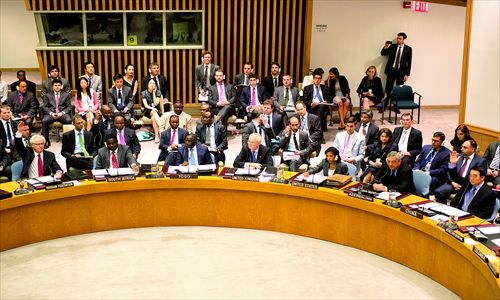China sticks to non-military intervention on Syrian crisis

Russia and China vetoed another UN resolution on Thursday which threatened to impose sanctions on the regime of Syrian President Bashar al-Assad. This is the third double veto against a Western-backed Syria resolution.
Western countries are again blaming Russia and China for a split UNSC vote. They seem to have forgotten that one of the most important principles of the UN is opposing military intervention in a country's internal affairs.
It is a shameless lie to attribute the escalating tension in Syria to China and Russia. Without the West's support, the small-scale conflict wouldn't have turned into today's bloody confrontation. If the West had truly backed Kofi Annan's peace plan and responded to calls from Russia and China, Syria could have avoided the situation it is in now.
It's likely that the Assad administration will be overthrown. But China does not necessarily need to change its policy and principle of opposing foreign military intervention in Syria. China should stick to this attitude until the last day before UNSC's intervention in the Syrian situation is needed.
The suicide bombing Wednesday showed that the intensity of conflicts in Syria has reached a new level and the chances of a political solution are becoming increasingly small.
The Syrian opposition and the West will certainly be encouraged by the situation, which helps reaffirm their belief that the ouster of Assad is the only option.
Since the outbreak of the Syrian crisis, Western nations, anti-Assad forces in the Arab world and Syrian opposition groups have formed an unusual alliance that has caused the crisis to evolve from small-scale clashes to large-scale conflicts.
How the Syrian issue develops in the future is largely up to how much public support Assad has at home. Changes in Syria might come rapidly, unless Assad's supporters are strong enough to continue fully backing the Syrian government.
There are people who believe that China will be embarrassed once opposition groups come to power in Syria or that China might even face revenge attacks from these groups. Such an idea is completely baseless. Nations that stick to their principles and wish for peace will never be shamed.
That said, however, China does need contingency plans to deal with developments in Syria. China is not taking sides, but merely opposed to war and killing.
The Syrian situation already tells us that the West is powerful in catalyzing political changes in a country. As long as the changes are in accordance with their interests, they don't really care if they are brought about peacefully or harm the well-being of locals.
No matter how the Syrian situation proceeds, we hope ordinary Syrians will suffer less from the process.
Global Times Report
Russia, China veto Syria sanctions
Russia and China on Thursday vetoed a Western-backed resolution that would have imposed sanctions on Syria at a UN Security Council meeting.
The proposed resolution threatened non-military sanctions against Syrian President Bashar al-Assad's government if he did not withdraw troops and heavy weapons from populated areas within 10 days, and is tied to Chapter 7 of the UN Charter, which could have allowed the UN to use force to end the conflict.